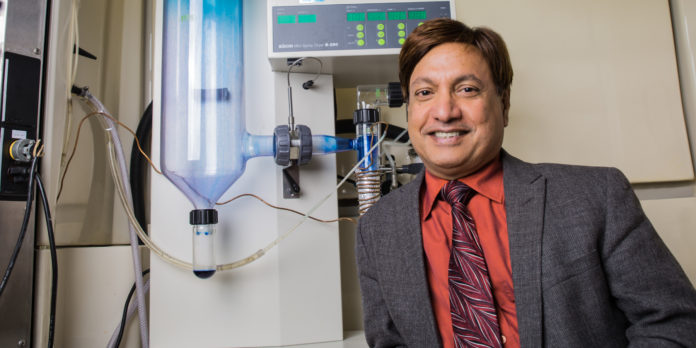With distribution of the COVID-19 vaccine now underway, the novel coronavirus may be controlled in some parts of the world by this summer, a Mercer University College of Pharmacy vaccine researcher says.
“Hopefully by this summer, at least, we would have controlled everything in the U.S.,” said Dr. Martin D’Souza, a professor of pharmaceutical sciences who focuses on the design and delivery of nanovaccines for infectious diseases and cancer. “And then hopefully the rest of the world by 2022 may get vaccinated, and all these major outbreaks should then subside.”
Currently, two COVID-19 vaccines — manufactured by Pfizer-BioNTech and Moderna — are authorized for use in the United States. Both are messenger RNA vaccines, also called mRNA vaccines, and are a new approach to protect against infectious diseases.
These mRNA vaccines are different from traditional vaccines, which use a weakened or killed version of the virus to build up immunity. Instead, the mRNA vaccine generates the spike protein found on the surface of the coronavirus, Dr. D’Souza said.
As a result, the body generates antibodies to protect against the spike protein in advance, he said.
“So as soon as anyone is exposed to the coronavirus, the body already has its payload of antibodies against this spike portion of the virus, and it can basically take care of and wipe out the virus instantly,” he said. “The virus doesn’t really stand a chance.”
Both the Pfizer-BioNTech and Moderna vaccines require two doses, three to four weeks apart. Peak immunity occurs two weeks after the last shot.
However, those who are vaccinated still should wear masks and practice social distancing, especially as new COVID-19 variants are discovered, until the virus is under control, Dr. D’Souza said.
So far, recently identified variants appear to be mutations of the spike protein. And if that’s the case, the current vaccines should continue to work effectively, he said. On Jan. 25, Moderna said it believes its vaccine will work against the new variants.
But “if other parts of the virus start to mutate, then it would be completely useless,” Dr. D’Souza said. “We are really in the early stages now, so the virus is going to try to get clever over time, and the longer it stays around, and people are not vaccinated, the more chances it has to mutate.”
That is why it is so important to vaccinate as many people as quickly as possible, he said.
COVID-19 vaccines are safe
Although the COVID-19 vaccines are the first of their kind, researchers have been studying the mRNA method for decades. These vaccines are safe, Dr. D’Souza said.
One reason is because the mRNA never enters the cell’s nucleus, which is where genetic material is kept. And once the mRNA does its job, the cell breaks it down and removes it.
“It never really gets into the main system of the cell,” he said. “It’s basically sitting on the periphery. That’s why there is no risk of anything causing problems down the road.”
One of the reasons mRNA vaccines historically have not been considered a popular method is because mRNA is very unstable and must be kept extremely cold, Dr. D’Souza said. The Pfizer-BioNTech vaccine must be kept at minus 70 degrees Celsius.
Not only are the special storage conditions costly for some companies and doctor’s offices, but the technology involved in making the vaccine is extremely expensive, he said.
His own research focuses on creating the next generation of vaccines, using tiny, bead-like microparticles that would be delivered using a painless microneedle. He’s currently working on a COVID-19 vaccine but expects microneedle-based influenza vaccines to be the first of this kind to come to the market in the coming years.
Dr. D’Souza said he expects more traditional COVID-19 vaccines to enter the market in the next few months. This will help speed up vaccine delivery not only in the U.S. but around the world.
“No one is protected until the whole world is protected,” he said.










